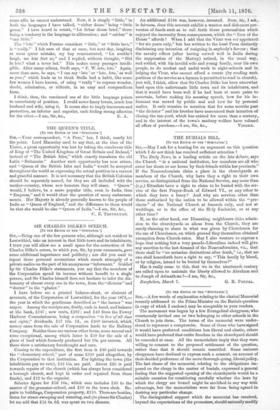THE BURIALS BILL.
[TO THE EDITOR. OF THE "EPROM/M.1
SIR,—May I ask for a hearing for an argument on this question. which I do not think has received sufficient attention ?
The Daily News, in a leading article on the late debate, says the Church " is a national institution, her members are all who, enter her doors or are borne by their friends within her precincts."' If the Nonconformists claim a place in the churchyards as members of the Church, why have they a right to their own service, as distinguished from the National Service, any more than (e.g.) Ritualists have a right to claim to be buried with the ser- vice of the first Prayer-Book of Edward VI., or any other to which they have a fancy? And why are services other than those authorised by the nation to be allowed within the " pre- cincts " of the National Church at funerals only, and not at weddings, or in the office of the Holy Eucharist, or at any other time ?
If, on the other hand, our Dissenting neighbours claim admis- sion to the churchyards as aliens from the Church, they are surely claiming to share in what was given by Churchmen for the use of Churchmen, on which ground they themselves obtained exemption from Church-rates. May I also venture to express a hope that nothing but a very pseudo-Liberalism indeed will give any sanction to the last demand of the Nonconformists, viz., that there shall be "no sectarian distinctions after death," i.e., that no- one shall henceforth have a right to say, "This family by blood, or by religion, intend to be buried by themselves ?"
Has it really come to this, that we in the nineteenth century- are called upon to maintain the liberty allowed to Abraham and to Joseph of Arimath tea 7—I am, Sir, &c.,


































 Previous page
Previous page